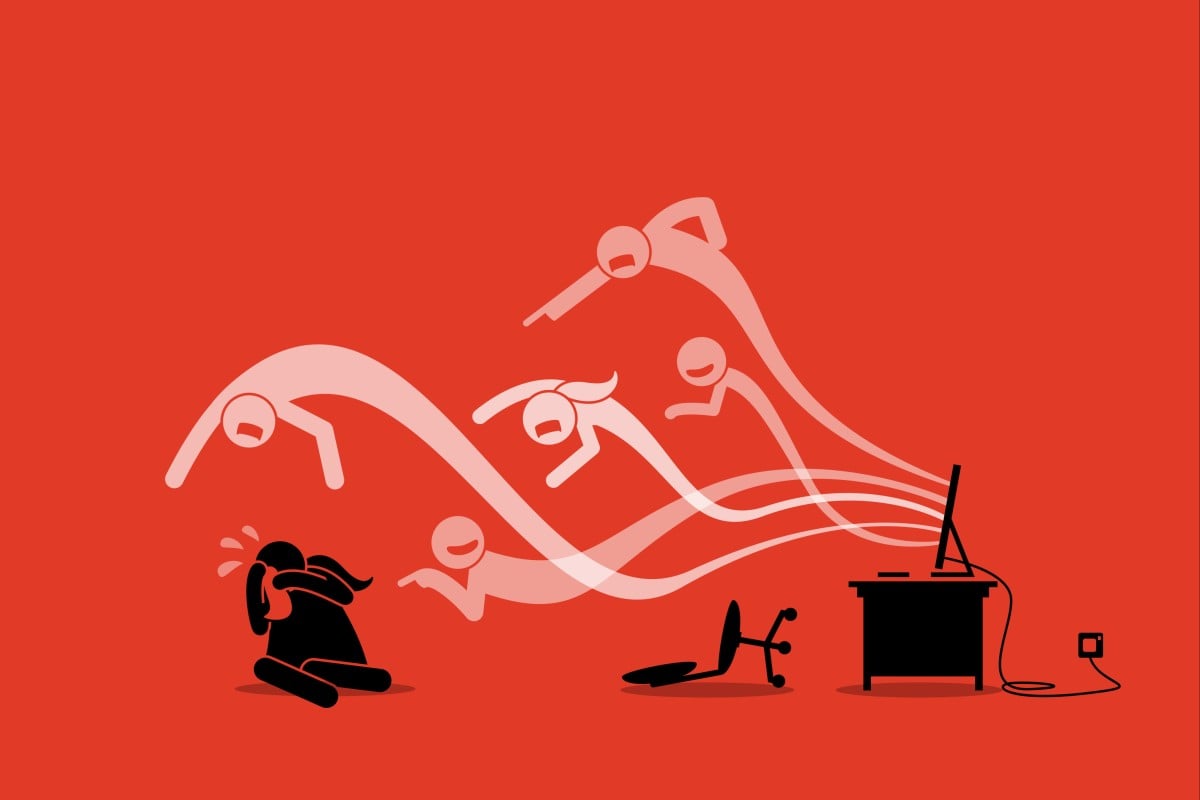
- Hong Kong social worker and psychotherapist explains why many might not be aware of their actions and how they can handle their feelings in a better way
- Every week, Talking Points gives you a worksheet to practise your reading comprehension with exercises about the story we’ve written
 Cyberbullying is a serious problem, and many bullies do it because they feel lonely and don’t know how to express their emotions. Photo: Shutterstock
Cyberbullying is a serious problem, and many bullies do it because they feel lonely and don’t know how to express their emotions. Photo: ShutterstockEveryone has said or done something mean at some point in their lives. Perhaps, we were angry or jealous, and we excluded someone from a group chat or spread rumours about them.
This might make us feel good in the moment, but these are acts of cyberbullying and can be hurtful to others and ourselves.
“Sometimes, teenagers don’t even know that they’re engaging in cyberbullying,” said Katie Leung Pui-yan, a partner and child and family therapist at Therapy Partners in Hong Kong.
“This is interesting because most people see cyberbullying as deliberate efforts to hurt someone.”
Leung told Young Post about why cyberbullies might not be aware of their actions and how they could deal with their feelings in a healthier way.
Root of the problem
Cyberbullying can be when someone uses the internet to make fun of other people, send threats, spread rumours or post embarrassing photos of a person without their agreement.
It also encompasses when a group of people unfollow a person on social media or target them in online games.
According to Leung, all forms of bullying often stem from making decisions based on emotions without thinking about the consequences.
Help! My classmate is bullying me, and she says it’s her ‘freedom’ to do it
“We might have moments in which we experience feelings of raw jealousy or hatred. And then we’re sitting on these feelings overwhelmed and don’t really know what it is – that’s when we act on impulse,” she said.
When they hurt others, it can give them a sense of control over their feelings and make them feel better, but it does not last. This can be even tougher for teens, since the human brain is not fully developed until the age of 25.
But Leung stressed that even though these emotions might be tough to control, it did not justify the harm caused to victims who can become emotionally distressed and feel alone.
“To an extent, we can understand where these behaviours come from. We can be empathetic towards them, but it doesn’t necessarily mean that they are right,” she noted.
Bullying can also have negative consequences for perpetrators.
“Not many people realise this, but cyberbullies can feel lonely because they do not know how to express their pent-up emotions other than saying or doing mean things,” the psychotherapist said, adding that the bully might develop a bad reputation that could drive away their friends.
How emotional regulation can help
Instead of lashing out, Leung recommended that bullies try to manage emotions in a healthy way when they feel overwhelmed.
“It’s basically figuring out how to calm down when you are emotionally charged,” she said.
According to the psychotherapist, there are two types of emotional regulation: self-regulation and co-regulation.
Self-regulation is when we manage our feelings on our own. The first step to this is identifying our emotions.
“When we acknowledge our feelings and label them, we validate the emotional part of the brain. And then our logical part of the brain will then prompt us to find ways to make ourselves feel better such as counting to 10, taking deep breaths or taking a break from social media,” she explained.
Co-regulation, on the other hand, refers to managing our emotions with help from someone else. This can be done by talking to a friend, trusted adult, or therapist about how we feel. This person can help us to name our feelings and come up with coping methods.
It is also important to identify what could trigger our emotions so we can learn to hold ourselves back instead of acting immediately on our impulses.
Leung suggested having a reaction plan for what to do if someone says or does something you don’t like.
“This can be really simple, such as promising yourself that [you] will say at least one nice thing to them. You can do this quietly without telling anyone,” the social worker said.
The most important step is making the decision to improve yourself.
“Nobody sets out to be a cyberbully. Maybe we have tendencies; we have impulses; and sometimes we do things that we’re not exactly proud of – and that is OK if we own up to it. But regardless, the desire [to change] has to come from within first,” Leung said.
“It’s easy to hide behind the screen to do something to somebody, but there are consequences as to how others see us and how we see ourselves. Ultimately, it is a question of who you want to be.”
To test your understanding of this story, download our printable worksheet or answer the questions in the quiz below.
